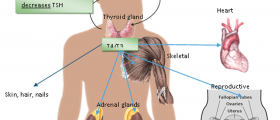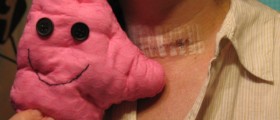I had my thyroid removed in 2016 because I tested positive for cancer. After surgery it was negative. I had them test again also negative. That is when all my heart problems begin. I developed AFIB and was taking to much thyroid medicine so the cardio version didn't work and didn't know I had to much medicine until after. Now on heart meds forever. Excessive weight gain. I was diagnosed with low blood sugar at 18. Now 62. So how does my body convert my T4 to T3. How does the medicine work different then my thyroid?
Loading...
Hello, guest.
After thyroid removal (thyroidectomy), the body can no longer produce thyroid hormones (T4 and T3) naturally, which are crucial for regulating metabolism, heart function, and more. Since you no longer have a thyroid gland to produce these hormones, thyroid hormone replacement therapy is necessary.
In your case, you are likely taking levothyroxine, a synthetic form of T4. Normally, the body converts T4 to T3, the more active form of the hormone, in various tissues. This conversion is crucial because T3 is the hormone that actively regulates metabolism and other body functions. After thyroid removal, this conversion still happens, but it relies on the synthetic T4 provided by your medication.
The balance of thyroid hormone levels is delicate, especially in the context of other health conditions like atrial fibrillation (AFib) and low blood sugar. Excess thyroid hormone (like from taking too much medication) can exacerbate heart problems, including AFib, and can also impact blood sugar levels.
Regarding weight gain, this is a common issue for people with thyroid disorders, especially when the thyroid hormone levels are not optimally balanced. Thyroid hormones play a significant role in regulating metabolism, so any imbalance can affect weight.
It's important to have regular monitoring of your thyroid hormone levels to ensure that the dosage of your medication is appropriate for your body's needs, taking into account your other health conditions. The goal of thyroid hormone replacement therapy is to mimic as closely as possible the natural function of the thyroid gland, but achieving the right balance can sometimes be challenging and requires ongoing adjustment and monitoring.
Loading...
















